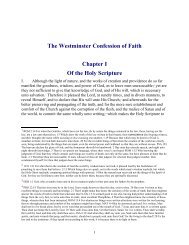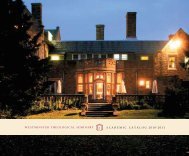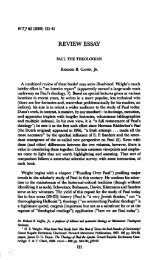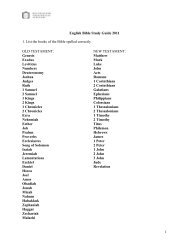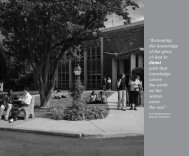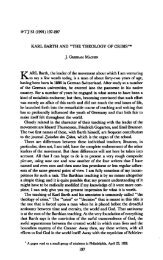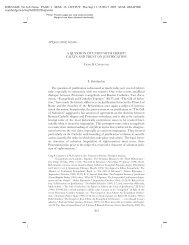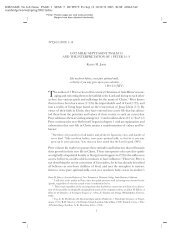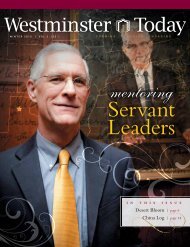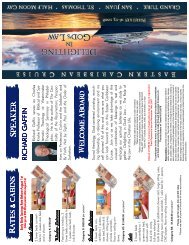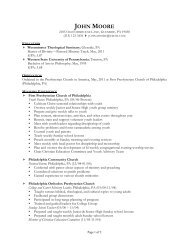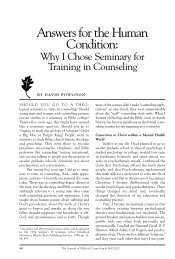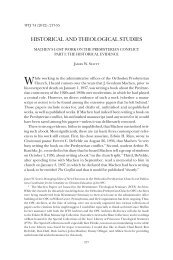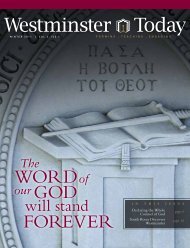2009 - 2010 Academic Catalog - Westminster Theological Seminary
2009 - 2010 Academic Catalog - Westminster Theological Seminary
2009 - 2010 Academic Catalog - Westminster Theological Seminary
Create successful ePaper yourself
Turn your PDF publications into a flip-book with our unique Google optimized e-Paper software.
{About <strong>Westminster</strong>}<br />
applying the teaching of Scripture and in developing a biblical<br />
worldview.<br />
• A learned ministry set in the lifestyle of humble and “holy affection”<br />
for Jesus Christ is essential in today’s church and world<br />
and must be modeled by the board, administration, faculty, and<br />
students.<br />
• A fundamental mandate of the church, discipling the nations<br />
for the glory of Christ, requires culturally sensitive, theologically<br />
competent ministers who have both the ability and the passion<br />
to apply “the eternal word” of Scripture to “the changing world”<br />
in which God has placed us.<br />
• Because there is “one body and one Spirit,” all who would “build<br />
up the whole body of Christ” must “make every effort to keep<br />
the unity of the Spirit in the bond of peace.”<br />
<strong>Westminster</strong> is committed to Scripture and to the systematic<br />
exposition of biblical truth known as the Reformed faith. Copies<br />
of the <strong>Westminster</strong> Confession of Faith are available from the<br />
Admissions Office. In addition to the <strong>Westminster</strong> Confession of<br />
Faith and Catechisms, the <strong>Seminary</strong> treasures the rich and harmonious<br />
diversity of creeds and confessions within the historic<br />
Reformed tradition. In particular, it recognizes that the system<br />
of doctrine contained in Scripture is also confessed in the Three<br />
Forms of Unity (the Belgic Confession, the Heidelberg Catechism,<br />
and the Canons of Dort). <strong>Westminster</strong> desires to be used in training<br />
ministers of the gospel and others for service in those churches<br />
committed to the Three Forms of Unity as subordinate standards.<br />
Our Curriculum<br />
Based on our core values, the curriculum of the <strong>Seminary</strong><br />
includes:<br />
• Theism and philosophical apologetics, which establish the presuppositions<br />
of the gospel;<br />
• The languages of the Bible, biblical introduction, biblical exegesis,<br />
biblical history, and biblical theology, which defend and<br />
expound the Scriptures;<br />
• Systematic theology, which is the logical setting-forth of the<br />
system of doctrine the Scriptures contain;<br />
• Church history, which records the history of God’s dealings with<br />
his people after the close of the apostolic age;<br />
• Homiletics, church government, liturgics, pastoral theology,<br />
missions, urban ministry, biblical counseling, and Christian<br />
education, which concern the presentation and application of<br />
the gospel to the modern world.<br />
History and Government<br />
<strong>Theological</strong> education in the United States was originally available<br />
only to students who were tutored and mentored by able ministers.<br />
In the eighteenth century, a number of pastors were widely<br />
known for their willingness to take students under their oversight<br />
and guide their reading. Often a single minister mentored many<br />
students at a time.<br />
When formal theological seminaries were organized, one of the<br />
first was the <strong>Theological</strong> <strong>Seminary</strong> of the Presbyterian Church at<br />
Princeton, New Jersey, where instruction began in 1812. Founded<br />
by the General Assembly of the Presbyterian Church in the<br />
United States of America, the seminary held to the <strong>Westminster</strong><br />
Confession of Faith and Catechisms as its doctrinal standards.<br />
Princeton excelled under the leadership of distinguished teachers<br />
who devoted themselves vigorously and effectively to the development,<br />
propagation, and maintenance of the Reformed faith. Among<br />
those best known as teachers of the great scriptural system of<br />
theology set forth by Princeton’s first professor Archibald Alexander<br />
were Charles Hodge, J. A. Alexander, B. B. Warfield, and J. Gresham<br />
Machen. But eventually a movement surfaced to end Princeton’s<br />
adherence to scriptural theology, and in 1929 Princeton <strong>Theological</strong><br />
<strong>Seminary</strong> was reorganized under modernist influences.<br />
Among the Princeton faculty who loved the Reformed faith were<br />
Robert Dick Wilson, J. Gresham Machen, Oswald T. Allis, and<br />
Cornelius Van Til. Almost immediately after Princeton’s reorganization,<br />
these four men founded <strong>Westminster</strong> <strong>Theological</strong> <strong>Seminary</strong>,<br />
and, with others who were invited to join the teaching staff, continued<br />
the exposition and defense of the Reformed faith. Over the<br />
years, <strong>Westminster</strong> has prospered as we have maintained the<br />
infallible Scriptures as our foundation.<br />
<strong>2009</strong>–<strong>2010</strong><br />
5



